Although human life spans (with child mortality factored in) used to be a mere quarter century, modern Americans can expect considerably longer lives. However, even were we to posit an unlikely social revolution in which life extension treatment was generally available to all, it seems that factors inherent in human biology limit maximum lifespans to about 120 years. Which, granted, is a lot better than twenty-five years. If still not as long as the lifetime of a sequoia or a bristlecone pine.
Imagine what we could accomplish, had we only a thousand years or so to procrastinate hone our skills? What grand projects could we embrace, knowing that we could see century-long efforts to their end? How wonderful it would be to live long enough to get that catchy Pharrell Williams earworm out of your head! Unsurprisingly, SFF authors have found the concept of greatly enhanced lifespans tremendously inspirational, as these five works show.
Fury by C. L. Moore and Henry Kuttner (1950)
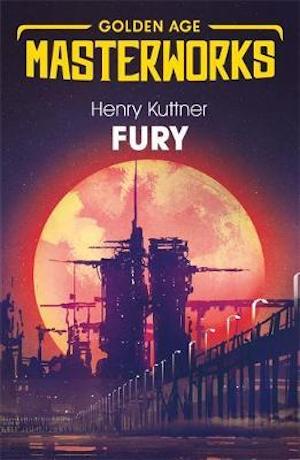
Earth’s atomic exuberance left that world a glowing, lifeless wasteland. Luckily for humanity, Venus provided a verdant new home. Less luckily for humans, the Venusian continents swarm with horrifyingly energetic life for which terrestrial life is but a convenient snack. Thus far, humans have survived only thanks to their well-protected subsea Keeps.
Having discovered that mutant immortals were living among them, the common folks decided to entrust—some might say abandon—politics and governance to the immortals. Rule by immortal brings stability but also stagnation.
Now changing circumstances have forced unhappily retired immortal mercenary Robin Hale to cast about for a project worthy of his skills: finally colonizing Venus’ continents. It is a project for the gods themselves. The ally Hale actually gets is Sam Harker, an immortal like Hale, but also a career criminal for whom the project is a delicious and potentially profitable con.
Old-time SF loved eugenics. In Harker’s case, his exemplary genes ensure he will be a leader. His regrettable appearance and upbringing (both orchestrated by Harker’s authentically terrible father) ensure that whatever leadership role he finds will be a criminal one. The resulting novel illustrates an interesting interplay of nature versus nurture. This energetic short novel also features a memorable final line.
World Without Stars by Poul Anderson (1967)
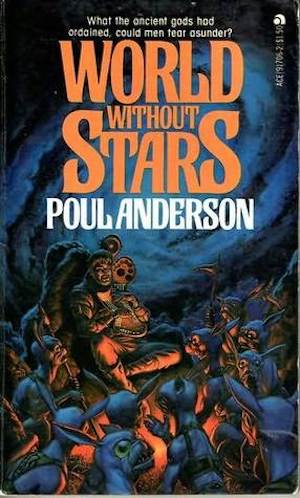
Immortality treatments gave humans time in which to do great things. Faster-than-light drives provided them with the space in which to do it. Three thousand years of exploration have not begun to scratch the surface of the Milky Way’s secrets. Nevertheless, when the opportunity to contact the enigmatic Yonderfolk—a newly discovered alien civilization located far out in the intergalactic depths—presents itself, the crew of the Meteor, Hugh Valland among them, are eager to accept the invitation.
Meteor’s name proves all too accurate. Meteor emerges from faster-than-light too close to an alien world. While most of the crew survives the crash landing that follows, the ship is wrecked and the survivors marooned. Hugh Valland is determined to somehow escape. He has human and alien allies. He also faces resistance from the gods of this world, gods who are very much a physical reality.
Poul Anderson’s fiction often gave the impression he was slightly less upbeat than Hamlet. This is a rare example of an Anderson in which almost everyone is happy, well-to-do, and engaged in worthwhile work. With some exceptions.
The Madness Season by C. S. Friedman (1990)
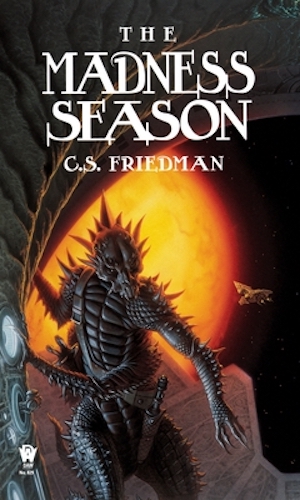
The alien Tyr are single-minded (a biological given) and find human thought processes incomprehensible. This didn’t slow their invasion and conquest of Earth, nor did it hamper the subsequent occupation. Should a human deviate from prescribed behaviors for some opaque human reason, the Tyr simply killed them (pour encourager les autres).
The Tyr’s offhandedly homicidal ways are a matter of concern for Daetrin Haal; he’s immortal and that’s forbidden. Were he discovered, he would be killed. Or so he believes. He is discovered and sentenced to exile. Exile may prove to be a slow execution—Haal has very specific dietary needs he may have trouble meeting out there in the stars—but it may also be an opportunity that will allow humankind to overthrow the alien overlords.
The Wellstone by Wil McCarthy (2003)
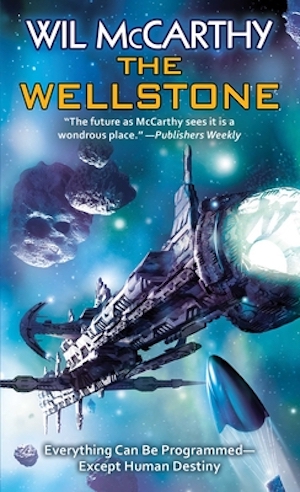
Thanks to the genius of King Bruno de Towaji, Earth and its Solar Dependencies are as close to utopia as possible. Thanks to the nearly omnipotent Faxes, able to create virtually anything whose pattern is known, material needs are easily met. Travelling from one location to another merely requires stepping into one Fax and out another. Anyone whose pattern is recorded cannot permanently die. Total bliss…except for one small oversight.
Immortality is a recent development whose implications were not fully grasped at first. Now the next generation chafes at the fact that their elders will never, ever die; they will never, ever evacuate the niches young people want for themselves, and will never stop treating the younger people as children. This is particularly vexing for Prince Bascal, a royal heir without any hope of inheriting. At least, not unless the older generation can be compelled to step aside….
Among the wildest aspects of McCarthy’s setting is the idea of an older generation that absolutely refuses to relinquish power. Imagine how annoying it would be for Millennials and Gen Z if Boomers and Gen Xers monopolized all the plum jobs and senior governmental roles for themselves! Not for me, obviously, because I was born in 1961, but for all those young people. It scarcely bears thinking about.
Frieren: Beyond Journey’s End by Kanehito Yamada & Tsukasa Abe (2020, ongoing)
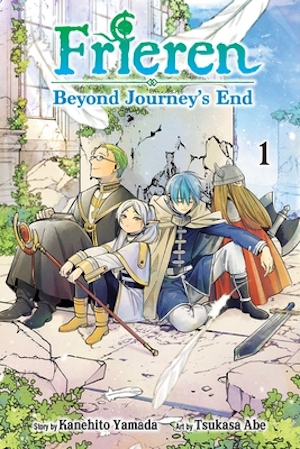
This manga begins at the end of a heroic quest: after ten years’ effort, stock fantasy adventurers Himmel (the hero), Heiter (cleric), Eisen (warrior), and Frieren (mage) have vanquished the Demon King. The elven sorcerer has bidden her companions goodbye and wandered off to resume her primary occupation: seeking out magical arcana. It is only when she reunites with her friends a scant fifty years later that a very grim truth is revealed.
Compared to an elf, even a young elf like Frieren, humans are tragically ephemeral. Fifty years was nothing to her, but it was most of a lifetime to Himmel and Heiter. Only when Himmel dies of advanced old age does Frieren grasp that she utterly squandered the chance to truly know her friend. A melancholy Frieren vows to do better in the future.
A mere twenty years of later, a now ancient and increasingly decrepit Heiter has a task he’d like to entrust to the elf. Convincing Frieren to accept a human apprentice will take some doing. Heiter has an abundance of flaws, all of which he has greatly enjoyed indulging, but he does have one great virtue, which is that he understands others better than they understand themselves. Thus, a very reluctant elf finds herself with a young human companion.
Manga often embrace an ambivalent attitude towards immortality (Mermaid Saga treats it as unambiguously bad, something to be avoided at all costs). Here immortality isn’t bad, per se, but living side by side with beings as smart as elves but with only a tenth of their lifespan is rich in tragic potential…something the authors cheerfully exploit.
***
Humans have imagined life with no death since they started telling stories. It should be no surprise that these five SFF tales are only a tiny subset of the many stories concerning immortality. Readers may feel I’ve overlooked the best ones. Comments are, as ever, below.
In the words of fanfiction author Musty181, prolific book reviewer and perennial Darwin Award nominee James Davis Nicoll “looks like a default mii with glasses.” His work has appeared in Publishers Weekly and Romantic Times as well as on his own websites, James Nicoll Reviews (where he is assisted by editor Karen Lofstrom and web person Adrienne L. Travis) and the 2021 and 2022 Aurora Award finalist Young People Read Old SFF (where he is assisted by web person Adrienne L. Travis). He is a four-time finalist for the Best Fan Writer Hugo Award, and is surprisingly flammable.










